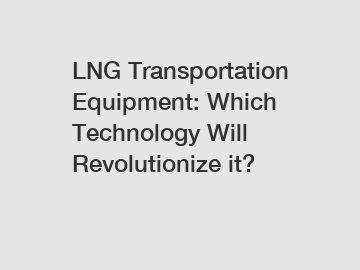LNG Transportation Equipment: Which Technology Will Revolutionize it?
LNG Transportation Equipment: Which Technology Will Revolutionize it?
The liquefied natural gas (LNG) industry is rapidly growing, reshaping the energy landscape with its cleaner and more sustainable fuel options. As the demand for LNG transportation equipment increases, there is a pressing need to explore technologies that will revolutionize this sector. In this blog, we will delve into some of the most promising advancements that have the potential to transform the industry.
One technology that has gained substantial attention is cryogenic transport containers, designed to carry LNG in its liquid form. These containers operate at extremely low temperatures to maintain the liquefied state of natural gas. They are durable, well-insulated, and can hold significant amounts of LNG, making them ideal for long-distance transportation.

The development of cryogenic transport containers has allowed for the expansion of LNG shipping capabilities. With increasingly larger container ships being built, more LNG can be transported in a single voyage, reducing costs and improving efficiency. This breakthrough technology gives the industry the ability to transport vast amounts of LNG across global expanses, facilitating its access to new markets.
Another technology that holds great promise is the use of natural gas-powered engines in LNG transportation equipment. These engines provide an efficient and environmentally-friendly solution for powering ships, trucks, and other mobile LNG carriers. Natural gas engines offer reduced emissions compared to traditional diesel engines, making them ideal for meeting stringent environmental regulations. With increasing sustainability concerns, this technology is set to play a significant role in the future of LNG transportation.
Furthermore, the latest advancements in onboard liquefaction systems are revolutionizing the transportation of LNG. These systems allow for the production of LNG directly on board vessels, eliminating the need for expensive and time-consuming onshore liquefaction infrastructure. Onboard liquefaction systems have the potential to revolutionize LNG transportation, making it more flexible and cost-effective. This technology can enable LNG to be produced and utilized in remote areas, unlocking new potential for natural gas as a primary energy source.
In addition to the advancements in hardware, digital innovations are transforming the way LNG transportation is managed and operated. Smart technology and data analytics are being integrated into LNG transportation equipment, optimizing operations and improving overall efficiency. These technologies enable real-time monitoring of LNG vessels, providing critical information on fuel consumption, engine performance, and potential maintenance requirements. This data-driven approach helps reduce costs, increase reliability, and minimize risks associated with LNG transportation.
Prominent players in the LNG transportation sector are also exploring the use of autonomous technology, which could revolutionize the industry in the near future. Autonomous vessels equipped with advanced navigation systems hold the potential to make LNG transportation safer and more efficient. Such vessels can operate with minimal human intervention, relying on artificial intelligence and sensors to navigate complex routes and handle potential obstacles. By reducing the need for human crew onboard, autonomous technology could significantly improve safety, reduce costs, and increase the capacity for LNG transportation.
It is important to note that as the LNG transportation industry evolves, safety remains a top priority. The technologies discussed above are continuously refined and tested to ensure they meet the highest safety standards. Stringent safety protocols and regulations are in place to safeguard the industry and its workers.
In conclusion, the LNG transportation industry is on the brink of a technological revolution. Cryogenic transport containers, natural gas-powered engines, onboard liquefaction systems, digital innovations, and autonomous technology are just a few of the advancements shaping the future of this sector. With each breakthrough, the industry moves closer to a cleaner, more efficient, and sustainable energy future. As these technologies progress and converge, LNG transportation equipment will continue to evolve, facilitate global trade, and meet the growing demand for natural gas as a fuel source.
For more information, please visit LPG Bobtail Truck with pump, LNG Cylinder, CNG Storage Equipment.
278
0
0

Comments
All Comments (0)